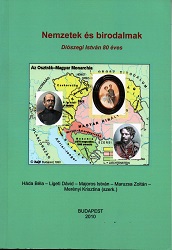
We kindly inform you that, as long as the subject affiliation of our 300.000+ articles is in progress, you might get unsufficient or no results on your third level or second level search. In this case, please broaden your search criteria.


Every Saturday for a period of two months, from the beginning of April till the end of June 1992, sessions organized by the Belgrade Circle were held at the Student Cultural Centre in Belgrade. At these sessions, ten in all, intellectuals, members of the Belgrade Circle and their quest – distinguished writers, scientists, artists, journalists, film and theatre directors, architects, actors, interpreters – expressed their own views of another, radically different Serbia. In times of anguish and affliction, the meetings, attended by a large assembly of listeners experiencing a kind of moral purification, were nonetheless imbued with a frail hope that there still might be a chance for a turn in events. With a desire to present ideas, opinions and sensations shared by the participants of the Belgrade Circle sessions to a much larger audience, the reading public, and to preserve them, because of their merit, in a more lasting form, discussions of over eighty intellectuals were compiled to form this book. In the meantime, the overwhelming disaster has reached its climax: »The Bosnian War«, still raging with no feasible way out as yet, exploded and blazed up like fire. The Belgrade Circle participants, distressed and abashed at the display of all those real or imagined evil deeds, so eagerly reported by the portentous heralds of death voiced hitherto often deeply hidden and silent feelings and thoughts about their burdensome disgust at the plague gripping and afflicting us all. Each participant contributed in his or her own way – rigorous scientific analysis, artistic susceptibility, eyewitness accounts, or simply. A public-minded desperate wail – to the shaping of one new, public opinion, the one that stirred in that sad Spring of ’92 and rebelled against the general fear, animosity, devastation, extermination, ethnic cleansing, forcible population exchanges... All those responsible and public-minded citizens, holding different political opinions, some members of various political parties, with incomparable personal experiences, varied professional interest and often of »objectionable« national origin, showed, however the will to insert tolerance among the basic principles of a humanized way of fife. But, in spite of the pronounced differences, their common aim, discernable in each and every speech imported to the audience, was to finally establish a community based on simple but as yet still unattainable ideals such as peace, freedom, tolerance and justice in place of degrading political, national and religious exclusiveness. Participants focussed their attention on various aspects of the problem: some analysed the roots of hatred and evil; some indicated the disastrous consequences of irresponsible national myth revivals; others warned of menaces yet to come unless we see reason in time. Some were stern, others witty and others still perhaps too prone to pathos, but they were all deeply concerned, and, as it unfortunately turned out, correct in predicting subsequent events. Therefore, individuals who take no notice of current, official policy and who have for a long time now tenaciously refused to render their talent and knowledge to the needs of the authorities, gathered round a project titled »Another Serbia«. Instigating a state of war and providing alleged erudite justification for the necessity of mutual extermination in the name of some noble goals, vague even to the very massacre executors, must not and cannot be the vocation of anyone who considers him or herself an »intellectual«, or earns a living acting as one. Hence, all session participants had but one desire: to mark out a path that may lead into a more promising future, to another, different, better and happier Serbia. »Another Serbia« soon became the synonym of resistance to fabricated lies, nationalistic madness, criminal war, a fascist holocaust, senseless destruction of villages and cities. Thanks are also due to the daily newspaper »Borba« which regularly reported on the Belgrade Circle Saturday sessions, and published a number of contributions presented there... We hope that the Another Serbia we all aspire to be easily discernable in the collection of essays presented in this book. The reader who hopes to find traces of at least some political program will be gravely disappointed. At present, when politics have poisoned the very soul of so many men of letters and knowledge, and when, among the most violent oppressors, in the ranks of all mortal enemy groups, one finds so many proud bearers of scientific degrees, who may actually be designated as men of unmerited and easily squandered reputation, it has become somewhat indecent to praise »intellectual pursuits«. The Belgrade Circle was, however, founded early in 1992 with the aim of retrieving dignity – another dangerous quality! – to public speech and conceived plans of action for the benefit of truth. We do not take an elitist position and stand indifferently above the crowd. On the contrary, being deeply involved and concerned, we place ourselves in its midst. The Association of Independent intellectuals insists upon its main goal, as declared in the program, namely, to bring together »critically oriented public figured who wish to unite their own civil and intellectual engagements with those of other, basically similarly oriented people«. That is why the Belgrade Circle will continue to »promote ideas, deeds and activities that affirm the values of a democratic, civil and plural society...« The Belgrade Circle will »encourage free and critical thought in all spheres of public life. It will support and help institutions and individuals who resist violence and animosity, and who plead for dialogue and for the survival of culture as the only humanly valid way of life«. Fine speeches? Maybe. Nevertheless, the Belgrade Circle has already, and despite many organizational and financial hardships, as well as ugly and unjust abuse from people who should have been, by the very nature of their vocation, in our ranks had they not knuckled under the burden of a more noble – national to be sure – mission, gained an undeniably high reputation. The words uttered with the aim of promoting »Another Serbia« and presented in this book to serve at testimony to the existence of a number of sensible people, shrewd and brave enough to resist suffocation by overwhelming absurdity, were not the only »weapon« used by Belgrade Circle members. They had also an active part in numerous civil and peace movements and events, thus contributing to the establishment of critical public opinion in Belgrade and Serbia: let us recall, for instance, the sad candles and our wake in the park, with souls colder than the Belgrade frost, while one of the past infernal wars – God, which one was it? – was raging out there somewhere; let us recall the »Black Band«, »Yellow Band«, »Student Protest ‘92«, and our endeavours to bring the people of Hrtkovci (»Srbislavci«) to reason; let us recall our guests from Pljevlja, Montenegro, Bosnia... All the time we were just launching our unhappy and, we believe, noble, though perhaps futile venture the very first participant said: let the Belgrade Circle begin it’s work! We hope that by offering this book to the public we have already come a long way.
More...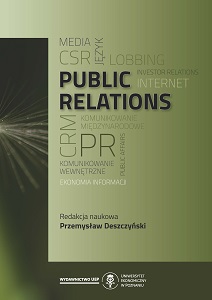
Międzynarodowe public relations należy traktować jako dziedzinę powstałą w konsekwencji zmian i wciąż pogłębiających się procesów zachodzących na arenie międzynarodowej. Globalizacja, mediatyzacja i demokratyzacja doprowadziły do powstania nowych aktorów w środowisku międzynarodowym, a także redefinicji roli państw od ośrodków administracyjnych do podmiotów konkurujących ze sobą w zglobalizowanej gospodarce. Umiędzynarodowienie życia gospodarczego wymaga dostosowania się do nowych warunków poprzez wdrażanie pewnych rozwiązań od strony praktycznej oraz pojęć w wymiarze teoretycznym, który ową praktykę stara się opisywać i wyjaśniać. W sytuacji coraz większej roli mediów funkcjonujących w skali międzynarodowej, pogłębiającej się demokratyzacji i globalnej konkurencji umiędzynarodowienie public relations zdaje się nieodzowne. Państwa i nowi aktorzy, do których zalicza się między innymi korporacje czy też organizacje międzyrządowe, konfrontując się z wyzwaniami, jakie stawia przed nimi współczesne życie gospodarcze, muszą podejmować się działań z zakresu międzynarodowych public relations, aby zyskać atrakcyjność i konkurencyjność w środowisku międzynarodowym. Dziedzina ta wykracza poza tradycyjne ujęcie public relations, ponieważ należy w niej uwzględnić różnice językowe, kulturowe i geograficzne. Istotne wydaje się także to, że ta dziedzina odgrywa niezwykle ważną rolę w perspektywie państw i organizacji międzyrządowych. Działania z zakresu międzynarodowych public relations tworzą dodatkową, pozornie nieuchwytną, wartość w postaci reputacji, miękkiej siły i marki kraju, co przekłada się na zaufanie, a w konsekwencji pozwala na wprowadzanie pozytywnych zmian, promowanie wartości, poprawę efektów ekonomicznych i budowanie pozycji podmiotu w środowisku międzynarodowym.
More...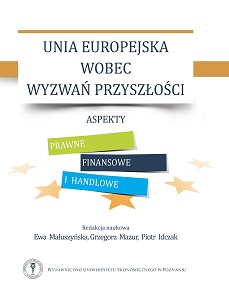
W ramach wspólnej polityki zagranicznej i bezpieczeństwa Unia Europejska stosuje sankcje mające wspomóc egzekwowanie jej celów, a zwłaszcza przestrzegania praw człowieka, demokracji i praworządności. Celem artykułu jest analiza skuteczności polityki sankcji Unii Europejskiej wobec Islamskiej Republiki Iranu. Zastosowaną metodą badawczą jest analiza porównawcza. Pierwsza część artykułu została poświęcona teoretycznemu ujęciu sankcji oraz czynnikom mającym wpływ na ich skuteczność. W następnym opisano podstawy systemowe wspólnej polityki zagranicznej i bezpieczeństwa Unii Europejskiej oraz zastosowanie sankcji jako jej elementu. W trzeciej części przedstawiono próbę oceny efektywności unijnej polityki sankcji wobec Iranu.
More...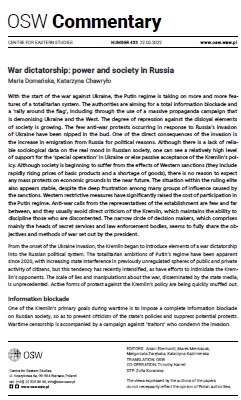
With the start of the war against Ukraine, the Putin regime is taking on more and more features of a totalitarian system. The authorities are aiming for a total information blockade and a ‘rally around the flag’, including through the use of a massive propaganda campaign that is demonising Ukraine and the West. The degree of repression against the disloyal elements of society is growing. The few anti-war protests occurring in response to Russia’s invasion of Ukraine have been nipped in the bud. One of the direct consequences of the invasion is the increase in emigration from Russia for political reasons. Although there is a lack of reliable sociological data on the real mood in Russian society, one can see a relatively high level of support for the ‘special operation’ in Ukraine or else passive acceptance of the Kremlin’s policy. Although society is beginning to suffer from the effects of Western sanctions (they include rapidly rising prices of basic products and a shortage of goods), there is no reason to expect any mass protests on economic grounds in the near future. The situation within the ruling elite also appears stable, despite the deep frustration among many groups of influence caused by the sanctions. Western restrictive measures have significantly raised the cost of participation in the Putin regime. Anti-war calls from the representatives of the establishment are few and far between, and they usually avoid direct criticism of the Kremlin, which maintains the ability to discipline those who are discontented. The narrow circle of decision makers, which comprises mainly the heads of secret services and law enforcement bodies, seems to fully share the objectives and methods of war set out by the president.
More...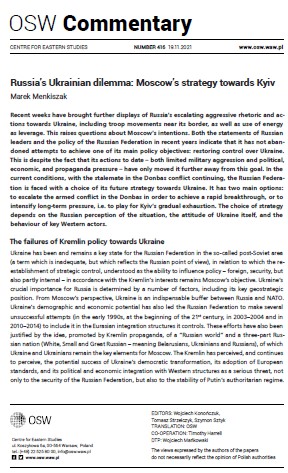
Recent weeks have brought further displays of Russia’s escalating aggressive rhetoric and actions towards Ukraine, including troop movements near its border, as well as use of energy as leverage. This raises questions about Moscow’s intentions. Both the statements of Russian leaders and the policy of the Russian Federation in recent years indicate that it has not abandoned attempts to achieve one of its main policy objectives: restoring control over Ukraine. This is despite the fact that its actions to date – both limited military aggression and political, economic, and propaganda pressure – have only moved it further away from this goal. In the current conditions, with the stalemate in the Donbas conflict continuing, the Russian Federation is faced with a choice of its future strategy towards Ukraine. It has two main options: to escalate the armed conflict in the Donbas in order to achieve a rapid breakthrough, or to intensify long-term pressure, i.e. to play for Kyiv’s gradual exhaustion. The choice of strategy depends on the Russian perception of the situation, the attitude of Ukraine itself, and the behaviour of key Western actors.
More...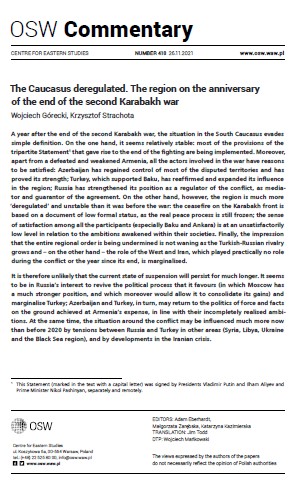
A year after the end of the second Karabakh war, the situation in the South Caucasus evades simple definition. On the one hand, it seems relatively stable: most of the provisions of the tripartite Statement that gave rise to the end of the fighting are being implemented. Moreover, apart from a defeated and weakened Armenia, all the actors involved in the war have reasons to be satisfied: Azerbaijan has regained control of most of the disputed territories and has proved its strength; Turkey, which supported Baku, has reaffirmed and expanded its influence in the region; Russia has strengthened its position as a regulator of the conflict, as mediator and guarantor of the agreement. On the other hand, however, the region is much more ‘deregulated’ and unstable than it was before the war: the ceasefire on the Karabakh front is based on a document of low formal status, as the real peace process is still frozen; the sense of satisfaction among all the participants (especially Baku and Ankara) is at an unsatisfactorily low level in relation to the ambitions awakened within their societies. Finally, the impression that the entire regional order is being undermined is not waning as the Turkish-Russian rivalry grows and – on the other hand – the role of the West and Iran, which played practically no role during the conflict or the year since its end, is marginalized.
More...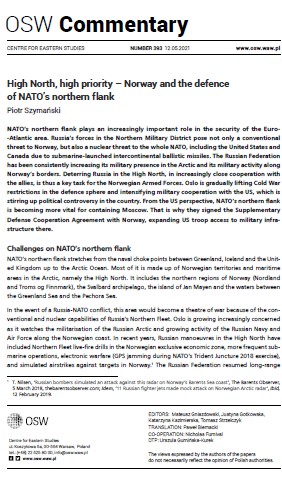
NATO’s northern flank plays an increasingly important role in the security of the Euro--Atlantic area. Russia’s forces in the Northern Military District pose not only a conventional threat to Norway, but also a nuclear threat to the whole NATO, including the United States and Canada due to submarine-launched intercontinental ballistic missiles. The Russian Federation has been consistently increasing its military presence in the Arctic and its military activity along Norway’s borders. Deterring Russia in the High North, in increasingly close cooperation with the allies, is thus a key task for the Norwegian Armed Forces. Oslo is gradually lifting Cold War restrictions in the defence sphere and intensifying military cooperation with the US, which is stirring up political controversy in the country. From the US perspective, NATO’s northern flank is becoming more vital for containing Moscow. That is why they signed the Supplementary Defense Cooperation Agreement with Norway, expanding US troop access to military infrastructure there.
More...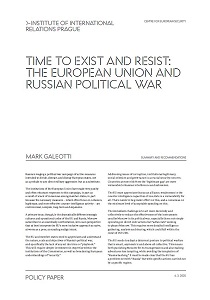
Russia is waging a political war campaign of active measures intended to divide, distract, and dismay European states, not as a prelude to any direct military aggression but as a substitute. The institutions of the European Union have made very patchy and often reluctant responses to this campaign, in part as a result of a lack of consensus among member states, in part because the necessary measures – which often focus on cohesion, legitimacy, and more effective counter-intelligence activity – are controversial, complex, long-term and expensive. A primary issue, though, is the dramatically different strategic cultures and operational codes of the EU and Russia. Moscow subscribes to an essentially confrontation, zero-sum perspective that at best interprets the EU’s more inclusive approach as naive, at worse as a pose, concealing malign intent. The EU and member states need to appreciate and understand the nature, scale and objectives of Russia’s political war, and specifically the lack of any set doctrine or “playbook.” This will require deeper investment in expertise within the institutions of the Commission, as well as broadening European understandings of “security.” Addressing issues of corruption, institutional legitimacy, social cohesion and governance is a crucial security concern. Countries at most risk from the ‘legitimacy gap’ are more vulnerable to Russian interference and subversion. The EU must appreciate that as an alliance, weaknesses in the counter-intelligence capacities of one state is a vulnerability for all. There needs to be greater effort on this, and a consensus on the minimum level of acceptable spending on this. The immediate challenge is to act more decisively and collectively to reduce the effectiveness of the instruments used by Moscow in its political war, especially those not simply operating on direct instructions but “adhocrats” seeking to please Moscow. This requires more detailed intelligence gathering, analysis and sharing, which could fall within the remit of INTCEN.
More...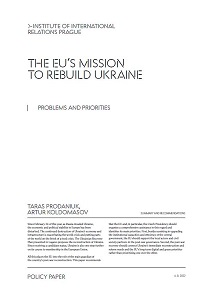
Since February 24 of this year, as Russia invaded Ukraine, the economic and political stability in Europe has been disturbed. The continued destruction of Ukraineʼs economy and infrastructure is exacerbating the world crisis and putting parts of the world on the brink of a food crisis. The Ukrainian Recovery Plan presented in Lugano proposes the reconstruction of Ukraine. Since receiving a candidate status, Ukraine is also one step further on its course to membership in the European Union. All this places the EU into the role of the main guardian of the countryʼs post-war reconstruction. This paper recommendsthat the EU and, in particular, the Czech Presidency should organize a comprehensive assistance in this regard and identifies its main priorities. First, besides assisting in upgrading the institutional capacities and efficiency of the central government, the EU should support the local actors and civil society partners in the post-war governance. Second, the post-war recovery should connect Ukraineʼs immediate reconstruction and reform needs and the EUʼs long-term digital and green priorities rather than prioritizing one over the other.
More...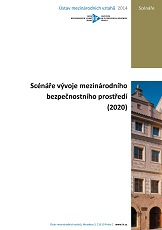
The document discusses the complexity of the global security environment and the emergence of hyper-risks due to interconnected anthropogenic systems. It suggests increasing resilience against hyper-risks by dividing existing systems into smaller units and creating circuit breakers to prevent cascading global reactions. The publication explores creative thinking about the future without precise probabilistic predictions, acknowledging the sudden and unexpected nature of significant events in complex systems, famously termed "black swans" by Nassim Taleb. It also examines geopolitical risks, the relative decline of US power, and the potential for a G-zero World scenario. The project's methodology is based on the complexity of the security environment, rejecting precise probabilistic forecasts and instead offering internally consistent hypotheses about future developments to aid in strategic thinking.
More...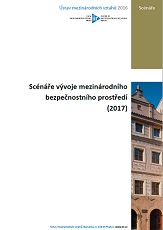
Držíte v rukou závěrečnou studii vznikající v rámci projektu TA ČR Scénáře mezinárodního bezpečnostního prostředí. Uzavírá se jí tříletý cyklus kolektivních spekulací týmu soustředěného v Ústavu mezinárodních vztahů o možnostech vývoje tohoto prostředí. Projekce, které vznikly jako výstupy těchto spekulací, nemají ambici být přesnými předpověďmi. Vysoká komplexita mezinárodního bezpečnostního prostředí jako systému, kde dochází k dynamické interakci množství předem daných skutečností, hybných sil a kritických neznámých, možnost takové předpovědi téměř vylučuje. Naše scénáře sledují jiný cíl: kombinací prediktivního (jaká budoucnost bude) a explorativního (jaká budoucnost může být) přístupu a záměrnou vícečetností podobně pravděpodobných projekcí vývoje v každém sektoru bezpečnostního prostředí být nástroji tvořivého promýšlení možných budoucností, rozšiřování horizontu úvah o tom, jak přispět k naplňování jejich z hlediska české zahraniční politiky nejvýhodnějších variant a zkoušení zažitých předpokladů o tom, co bezpečnostním prostředím, ve kterém se Česká republika nachází, hýbe.
More...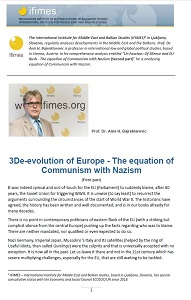
It was indeed cynical and out-of-touch for the EU (Parliament) to suddenly blame, after 80 years, the Soviet Union for triggering WWII. It is unwise (to say least) to resurrect the arguments surrounding the circumstances of the start of World War II. The historians have agreed, the history has been written and well documented, and is in our books already for many decades. There is no point in contemporary politicians of eastern flank of the EU (with a striking but complicit silence from the central Europe) pushing up the facts regarding who was to blame. There are neither mandated, nor qualified or even expected to do so.
More...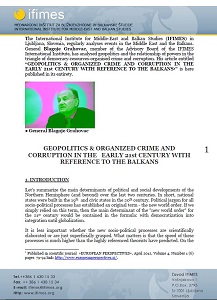
Let’s summarize the main determinants of political and social developments of the Northern Hemisphere (and beyond) over the last two centuries. In short, national states were built in the 19th and civic states in the 20th century. Political jargon for all socio-political processes has established an original term - the new world order. If we simply relied on this term, then the main determinant of the "new world order" for the 21st century would be contained in the formula: with democratization into integration until globalization.
More...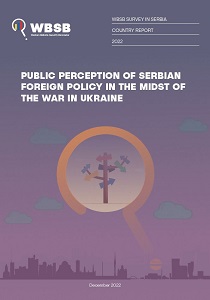
The war in Ukraine did not significantly affect the perception of the Serbian public regarding the major issues of Serbian foreign and security policy. In this context, this relates to how Serbian citizens think about the influence of great powers in their country and how the public perceives its relations with Russia and Western security institutions, the EU and NATO. The public opinion surveys also showed that the issue of Kosovo is still being perceived as a major foreign policy priority. There is a powerful cynicism in how the Serbian public views great power influences, as most respondents believe that external great powers bribe Serbian politicians and moguls to further their interests in the country. Russia and China are perceived as close foreign policy partners of Serbia, putting them in clear advantage over those who favour the EU on that front. The respondents also believed that Russia and China are sincere friends of Serbia and not players guided by their self-interest. As opposed to the study conducted by the Belgrade Centre for Security Policy (BCSP) in 2020, which noted that Serbs perceived Chinese influence in the country as more positive than Russian influence, the latest survey shows that those who believe Russian influence in Serbia is positive have a slight edge over those who believe the same about Chinese influence. This is most likely the result of the fact that China has not been in the spotlight in recent months.
More...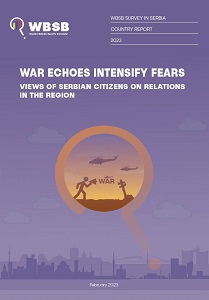
The Belgrade Centre for Security Policy conducted the annual public opinion survey on relations in the region, with a special focus on the Western Balkan countries and current events and trends. This report analyses Serbian citizens’ views on three main topics – the possibility of conflicts in the Balkans, Serbia’s bilateral relations with its neighbours, as well as key benefits and opportunities of regional cooperation and initiatives. Due to the current war in Ukraine and the war-mongering rhetoric in the Balkans, the fear of outbreak of conflict in the Balkans has risen. Compared to results from 2020, when more than half of citizens were not afraid of possible conflicts at all, the 2022 survey shows that almost two thirds of respondents are to a certain extent afraid of the outbreak of conflicts in the region in the next five years. Concerning potential causes of the conflict in the region, two-thirds of Serbian citizens believe that it is very or somewhat likely that a conflict might break out over the status of Kosovo. On the other hand, the results of the survey indicate a significant decrease in support of the reintroduction of mandatory military service, in comparison to results from 2020. When it comes to bilateral relations between Serbia and its neighbouring countries, the data shows a decline in support for potential separation of Republic of Srpska from Bosnia and Herzegovina and unification with Serbia. Citizens believe that relations between Serbia and Montenegro have not improved significantly, despite the signing of the Fundamental Agreement with the Serbian Orthodox Church. On the contrary, the negative perception of Serbian public towards Albania has slightly improved over the last two years, mainly due to the closer cooperation between the leaders of the two countries through the Open Balkan initiative. However, regional relations are still seen as strained, in part due to the promotion of the concept of Serbian world which creation is supported by slightly more than 40% of citizens. In 2022, the focus of the public in terms of regional cooperation was directed more directly to the Open Balkan initiative as a platform for collaboration between Albania, North Macedonia and Serbia. Although the data show an increase in the number of Serbian citizens who are familiar with the idea, there are still no concrete and publicly visible results of the initiative
More...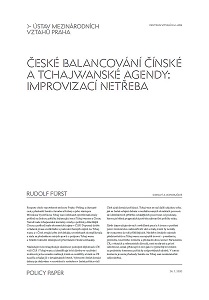
The contradictions surrounding the terminated Prague-Beijing treaty and the planned trips of Senate Presidents Jaroslav Kubera and his successor Miroslav Vystrčil to Taiwan have unexpectedly problematicized the view of Czech policy balancing between Taiwan and China. Will our Taiwanese contacts disrupt relations with the politically more important China and damage our economic interests in the PRC? The well-managed practice of simultaneously balancing Czech interests in Taiwan and China, lasting over two decades, has unexpectedly become complicated and has become the subject of sharp disputes about supporting Taiwan and defending national dignity from pressure from the Chinese embassy. The following text recaps the experience of the Czech Republic's dual diplomacy towards the PRC and Taiwan and identifies a crisis of confidence in the use of options that are easily offered, that have proven successful, and that the Czech Republic learned to manage already in the 1990s. The escalation of the Czech domestic debate is observed in connection with the split in Czech policy towards China and its domestic politicization. Taiwan has become another example of how the Czech public debate in mediatized abbreviations shifts to identity stories that distract attention from the essence, which is the common pragmatic need of the state's foreign policy. The conclusion recommends a return to proven practice and consideration of strengthening the positions of the Ministry of Foreign Affairs and the government, which should not be exposed to the role of bystanders. Visits by Czech state representatives to Taiwan at the highest level - the President, Prime Minister, line minister and chairmen of both chambers of the Parliament of the Czech Republic - for substantive and relevant reasons, it is not necessary to reject them a priori, but to proceed with them as exceptional steps subject to the consensus of politically responsible actors. In this context, the trip of the President of the Senate to Taiwan is insufficiently justified.
More...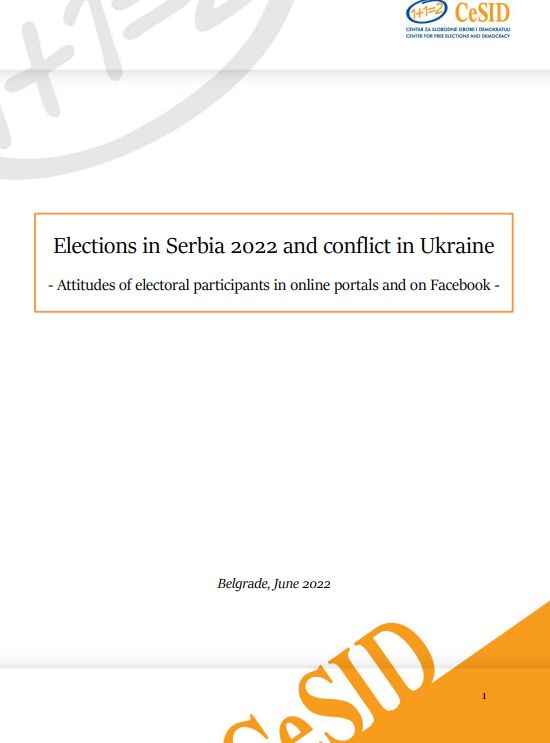
Attitudes of electoral participants in online portals and on Facebook
More...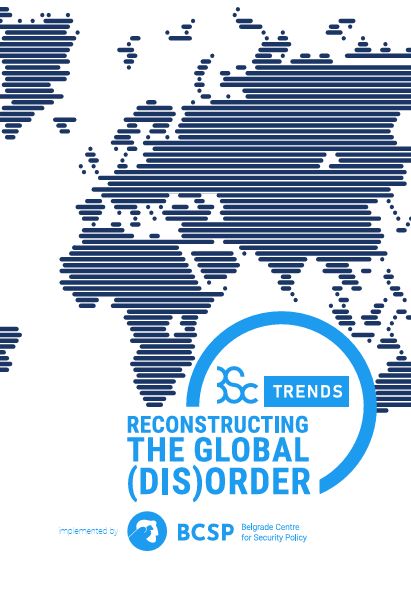
We proudly present you the ‘BSC Trends: Reconstructing the Global (Dis)Order,’ the companion publication to the Belgrade Security Conference 2023, held in Belgrade from October 11th to 13th, 2023. This publication aims to shed light on and discuss, following the style of BSC discussions, the most significant global, regional, and local events, phenomena, and developments that have marked this year. These topics were part of the panel discussions in this year’s BSC conference program.
More...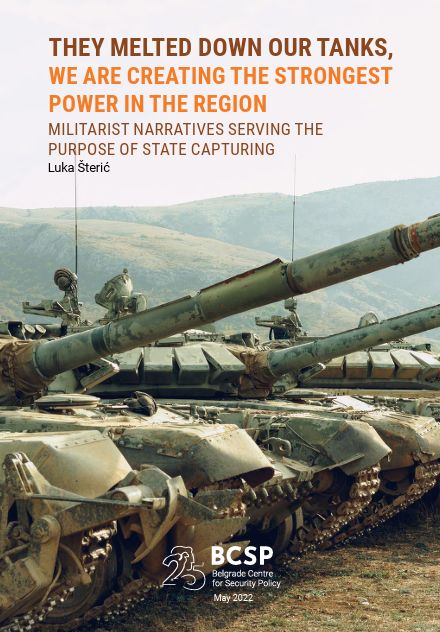
Defence system capturing is done in various ways. The authorities are using the procurement of armament from different parties to achieve foreign policy goals in order to reduce the external pressure on the authoritarian regime. Insisting on military neutrality and foreign policy balancing, Serbia is trying to keep access to both the Eastern and Western armament markets. Also, through non-transparent contracts, individuals and companies close to the government opulently profit at the expense of the military industry, as well as through exporting weapons often times conducted in contravention of both domestic and international law and norms.
More...